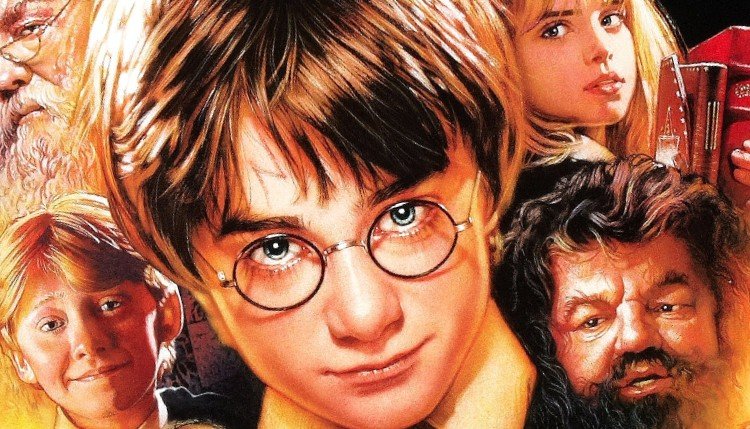Franchise Rewind: Harry Potter and the Sorcerer’s Stone (2001) Harry Potter and the Chamber of Secrets (2002)
Harry Potter and the Sorcerer’s Stone, 2001 (Daniel Radcliffe) Warner Bros.
Harry Potter and the Chamber of Secrets, 2002 (Daniel Radcliffe) Warner Bros.
“You’re a little scary sometimes, you know that? Brilliant… but scary.”
Joanne Rowling went on a strange adventure in a time period lasting five years, from 1990 to 1995. A complete amateur, she learned to write as she was working on her first book, Harry Potter and the Philosopher’s Stone, creating an enormous volume intended to introduce characters and overarching storylines that would continue for seven books; the most popular books ever published, and certainly the beginnings of the “Young Adult” demographic crossover and breakthrough.
Her success brought on scores of books intended for children to read. I remember Terry Gilliam saying that above all this was why J.K. Rowling would go to heaven. She got children to read. The series didn’t just appeal to children, however, as legions of adults (of all ages), my wife among them, would also take to reading the exploits of young wizard Harry Potter, and his friends, Ron Weasley and Hermione Granger. It’s astonishing to note how hard it was for Rowling to not only find an agent, but also to get a publisher interested.
A famous story goes that one prospective editor threw the manuscript in a rubbish bin, only for it to be fished out by his receptionist. She couldn’t put it down, alerting her boss to the book’s potential and appeal. It reminds me of the story of Ric Ocasek hating Weezer’s “Buddy Holly,” but when he walked into the studio one day, he heard a receptionist humming it incessantly. Some things catch on, and they catch on big. “What’s with these homies dissing my girl? Why do they gotta front?”
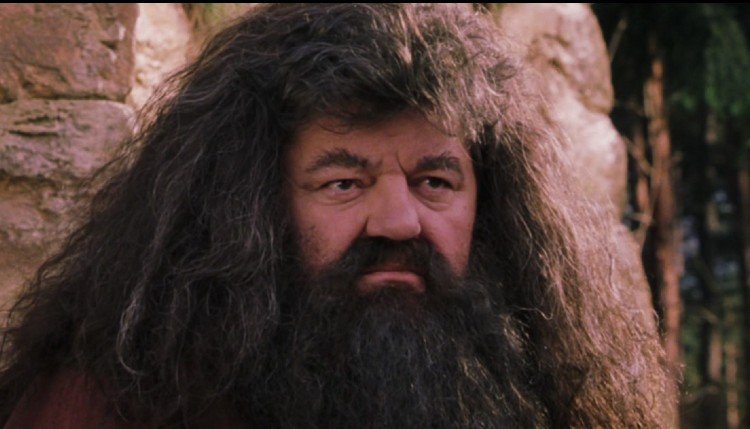
Bloomsbury Children’s Books fronted (heh) Rowling £2,500, but it wasn’t until Scholastic picked it up in the States that the book (and resulting series) exploded. The first four books would be published before Warner Brothers released the first movie in the series in November of 2001, directed by Chris Columbus and starring Daniel Radcliffe as Harry Potter. There’s some interesting, creepy stuff at play first when we’re introduced to the boy.
He is imprisoned within a closet under a stairwell by his muggle (meaning: powerless human) family. He gets into minor mischief, perhaps not fully understanding his powers, but he means well, and has always meant well. His obnoxious fat-faced cousin, Dudley, gets all the attention and accolades while Harry is ignored and abused. He starts to receive invitations (they seem more like summons or demands) to Hogwarts, a magical academy of sorts, run by Headmaster Albus Dumbledore.
It’s a school, but it’s a school of magic. Do they teach advanced calculus and global studies? Do math and social studies matter when you can eat chocolate frogs? His family confiscates all of these invitations, as scores and scores of them keep being delivered to the house (by a cool owl). Eventually resident big-guy Hagrid (Robbie Coltrane) shows up and liberates Harry from his horrible family. Did Harry ever agree to any of this, or is he just trying to escape from his stifling home life?
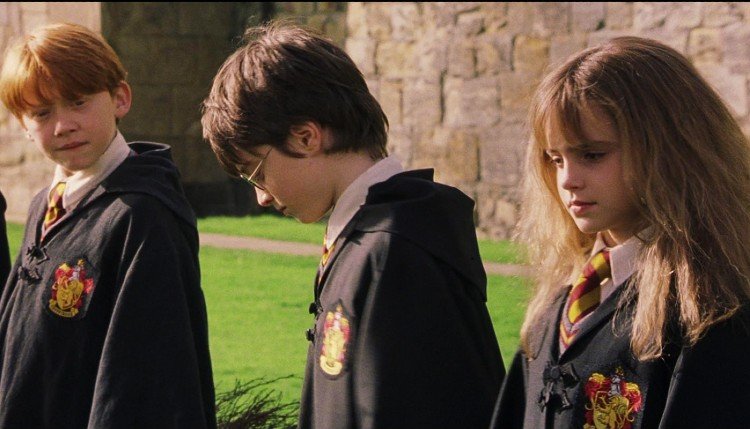
Either way, it’s an improvement, but here’s the big problem: everybody knows who he is. How is it he has a reputation before he even knows what he is? Isn’t it just gossip at that point? People talking about you behind your back, regardless of whether it’s positive or negative? Most of the film is taken up with Harry’s introduction to Hogwarts; meeting all of the characters that make up Rowling’s series of books. Most of these characters are telegraphed to either be loved or hated almost immediately, and there are specific cliques or “houses” within Hogwarts, like fraternities, and the children are pledged to those houses based on their perceived virtues (by way of the “Sorting Hat”).
Gryffindor, to which Harry and his friends are pledged, are brave. Hufflepuff is devoted to hard workers. Ravenclaw pledges are clever. Slytherin (which already sounds evil and conjures up images of snakes), pledges are ambitious and opportunistic. As Harry, Ron, and Hermione are all of the House of Gryffindor, are we to assume bravery is more important or more valuable than wisdom and enterprise? Interesting. How does the Sorting Hat know us better than we know ourselves? Our very real human world seems to covet ambition and duplicity above all, for those are the people who seem to be rewarded more than anyone.
Harry Potter is wish fulfillment that is deceptively simple and easy to understand. More than two-thirds of this first movie is taken up with the establishment of the franchise before we get any kind of story. Hagrid’s three-headed dog, “Fluffy,” guards a room that contains the “philosopher’s (oddly changed to “sorcerer’s” for the American release) stone” that can turn any kind of metal into gold. I wonder why powerful magicians would have a gold-based economy, or an economy of any kind, but my questions go unanswered.
Get used to the idea that Hogwarts has terrible hiring practices, because it seems like every movie introduces either an evil teacher or an incompetent teacher. Dark Arts teacher, Quirinus Quirrell, wants the stone and tries to kill Harry and his friends to get it, but for reasons that are never explained, Harry is able to reduce Quirrell to dust with a single touch. Still, this is a fun film even if it doesn’t make much sense. Columbus’ direction is pedestrian and generic as well as unnecessarily Anglophilic, like embarrassingly over-the-top in its depiction of blokes “across the pond.” Blimey! Good show!
“Not to be rude or anything, but this isn’t a great time for me to have a house-elf in my bedroom.”
After grossing over a billion dollars for the first movie (from a $125 million budget), Chris Columbus and screenwriter Steve Kloves return for the 2002 sequel, Harry Potter and the Chamber of Secrets. Let’s say there’s an ultra-powerful cadre of magicians engaging in endless battle against the demonic forces of evil, but we’ll remove all the proper names (we won’t talk about Satan, Lucifer, or God, in the Christian sense), replace them with goofy, Dickensian monikers, and place a young man in the crux of this eternal struggle.
I don’t think I ever read any news items, but I have to believe there were some Bible literalists and fundamentalist types who probably thought Harry Potter (and its ilk) was a calling card for the Devil. This is harmless stuff. As a matter of fact, Chamber of Secrets is nothing more than a Scooby Doo pastiche. In the third act, in Jon Peters fashion, a giant spider shows up, but I’m jumping ahead of myself. This is year two, and Harry is, once again, being persecuted by his muggle relations. These are extraordinarily cruel people who keep Harry imprisoned in a room with bars on the windows.
He had graduated from living in the tiny closet under the stairs from the previous movie. Harry goes along with his torture and imprisonment because the primary rule seems to be about not using magic against ordinary mortals, or something. If we lifted that exception, magic would capture the world (which it eventually does, but that’s a few books down the line). Harry is an exceptionally mature young man to tolerate his idiot family. Despite the bars on the windows, Ron rescues him and they’re off for their, I guess, sophomore year at Hogwarts.
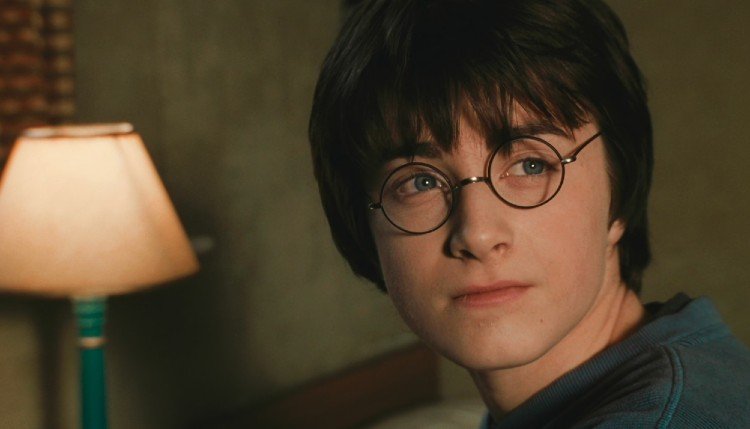
The “chamber of secrets” is revealed as the new macguffin when the janitor Filch’s cat, Mrs. Norris, gets petrified, and the ghost of a former student named Tom Riddle attempts to discredit Hagrid, when Harry finds his secret diary. So how weird does this get? Tom Riddle isn’t what you think? What’s interesting about Chamber of Secrets is what is interesting about the series as a whole. As the kids grow up, their problems get more intense and serious.
The first movie is an introduction of characters, subplots, and situations with a little mystery thrown in at the end; The Mystery of the Moving Pillow and such, while the second movie is a full-fledged, admittedly shallow kids adventure, mostly involving Harry and Ron, because Hermione becomes petrified. That’s a bit of a relief because Emma Watson is terrible in these early movies. Her acting “oeuvre” consists of shouting (and annunciating) everything in a bizarre, clipped British accent.
All the Brits in the first two movies are so over-the-top they play like superficial stereotypes of American propaganda. I mean, the kids say everything but, “Pip-Pip” and “Cheerio” while eating “bangers n’ mash” in their harsh determination to convince us they’re British. Call it “Anglophilia” TO THE MAX! I wonder how an American Harry Potter would play. Call him Hank Digger, Insane in the Membrane, and he carries a magic machine gun that sprays love and joy into the hearts of unsuspecting muggles. Ho! Ho! Ho!
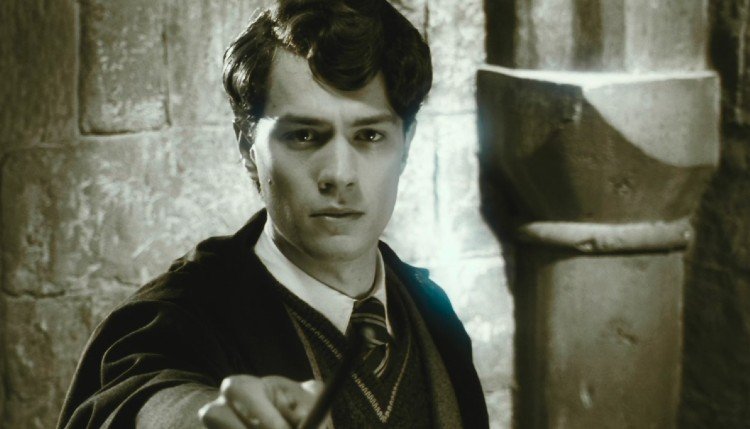
Speaking of which, Alan Rickman pops up once again, and his might be the most impressive performance for those who haven’t read the books. He’s very difficult to figure out. He creates a well-rounded character that is too straight to be the antagonist. He also embodies the bigotry these magicians have for “muggles,” a derogatory term for non-magical humans. We’ll see more of that in later movies. Tom Riddle, Snape, Hagrid, and Dumbledore all have a strange, cobweb-like history together. It’s a little like Obi-Wan, Darth Vader, and Luke Skywalker.
Tom Riddle is revealed to be Voldemort by movie’s end; the main heavy, “He Who Shall Not Be Named.” One other thing. This and the sequel, The Prisoner of Azkaban, were the only Harry Potter movies we saw in the theater. The rest, I guess, we waited until cable or video. Maybe it wasn’t as big a deal, and we were working on having a child, so movies took a backseat for a while. There were a lot of kids in the theater. That’s what I remember most. We could hear them chatting in the theater. It reminded me of the time I saw E.T. and Superman III when I was a kid; this incessant chattering from kids in the background.
The first two Harry Potter movies are tailor-made for children. After Columbus’ departure, the subject matter would become grimmer. It was almost as though the filmmakers were hoping their primary demographic would grow with Harry, Ron, and Hermione. If true, it was the most successful gambit in movie history. No other franchise had been able to keep up with its respective audience. Other than that, there’s very little to say about Chamber of Secrets, except that it is a live-action cartoon. Scooby Doo will be right back after these messages!

